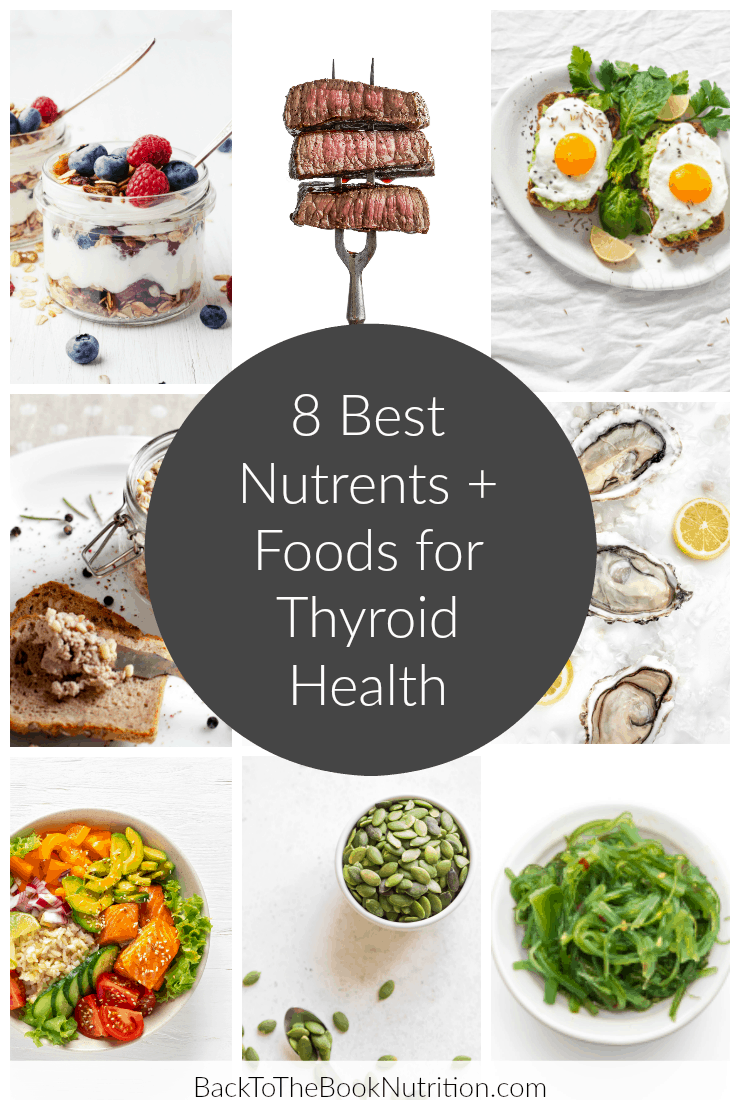Have you been diagnosed with hypothyroidism, hyperthyroidism, or even an autoimmune thyroid disease like Hashimoto’s Thyroiditis or Graves’ Disease? These 8 key nutrients and foods can help you optimize your thyroid health! Plus recipe links and supplement recommendations!
Note from Dena: This post was written by Kendall Farr, Dietetic Intern, as part of a research partnership between Back To The Book Nutrition and post-graduate nutrition students from the University of Houston.
Many people know the thyroid gland for its role in metabolism and weight loss. But the thyroid gland does so much more than just cause someone to lose or gain weight!
The butterfly-shaped gland in the neck is used by nearly every cell in the body and plays a key role in regulating countless body functions and reactions….so when the thyroid isn’t working well, it keeps other body systems like the gut, skin/hair/nails, heart, and more from working well.
Are you constipated?
Is your hair falling out?
Do your nails break easily?
Does your heart race?
Are you cold (or hot) all the time when others aren’t?
These are just a few of the signs of a thyroid problem that may signal a need to look deeper at your thyroid health.
Whether you’ve been diagnosed with hypothyroidism, hyperthyroidism, or are just looking to support optimal thyroid function, diet plays a key role!
8 Best Nutrients + Foods for Thyroid Health
These eight vitamins and minerals are crucial for thyroid health and consistently eating a variety of the foods listed can go a long way in supporting proper thyroid function.
1. Tyrosine
- General Roles of Tyrosine (9):
- Helps build muscle tissue
- Assists in making immune proteins (immunoglobulins)
- Helps body make Dopamine, the neurotransmitter that motivates us to take action
- How Tyrosine Helps the Thyroid (4):
- Combines with iodine to create thyroid hormone
- Foods High in Tyrosine:
- Meat, poultry, fish
- Eggs and dairy
- Tofu
- Beans
- Pumpkin seeds
2. Iodine
- General Roles of Iodine (4):
- May help with cognition
- Aids in the development of fetuses during pregnancy
- Cellular metabolism
- How Iodine Helps the Thyroid (2):
- Regulates thyroid hormone production, especially T4
- Deficiency can lead to goiter, a condition characterized by an enlarged thyroid gland
- Note: too much iodine intake can also have a negative effect so it’s important to strike a balance in intake
- Foods High in Iodine:
- Iodized salt
- Wild seafood
- Sea vegetables, like kelp, nori, etc.
3. Zinc
- General Roles of Zinc:
- Immune function
- Tissue/wound healing
- Helps many reactions in the body take place
- Needed for taste and smell
- How Zinc Helps the Thyroid (1,2,11):
- Helps make TSH
- Helps convert T4 to the active T3 form
- Helps regulate T4 and T3 levels in the blood
- Improves stomach acid levels to help nutrient absorption
- Foods High in Zinc:
- Oysters
- Beef
- Liver
- Pork
- Pumpkin seeds
- Yogurt or kefir
4. Iron
- General Roles of Iron:
- Helps with the transfer of oxygen from lungs to tissues
- Role in many chemical reactions throughout the body
- How Iron Helps the Thyroid (3):
- Helps in production of TPO (thyroid peroxidase) which then is used to form T4
- Aids in conversion of T4 to active T3 form
- Foods High in Iron:
- Heme iron (better absorbed)
- Liver
- Meat
- Fish
- Eggs
- Non-heme iron
- Breads
- Cereals
- Spinach
- Legumes
- Heme iron (better absorbed)
5. Selenium
- General Roles of Selenium:
- Antioxidant that helps prevent cell damage
- May reduce risk of certain cancers
- Bolsters immune system
- How Selenium Helps the Thyroid (5):
- Protects thyroid against oxidative damage
- Helps to form thyroid hormones
- Helps convert T4 to T3
- Significantly reduces TPO antibodies in Hashimoto’s Thyroiditis (10)
- Foods High in Selenium:
- Oysters
- Brazil nuts
- Eggs
- Tuna
- Halibut
- Salmon
6. Magnesium
- General Roles of Magnesium:
- Nerve and muscle function
- Blood pressure regulation
- Protein synthesis
- How Magnesium Helps the Thyroid (2,7):
- Aids in conversion of T4 to active T3
- Along with iodine deficiency, deficiency of magnesium is also related to goiter
- Foods High in Magnesium:
- Fatty fish
- Leafy greens
- Avocado
- Dark chocolate
- Nuts
7. Vitamin A
- General Roles of Vitamin A:
- Promotes good eyesight, especially in dark conditions
- Helps form and maintain healthy skin, hair, and teeth
- Supports cell growth
- How Vitamin A Helps the Thyroid (6):
- Helps regulate levels of TSH
- Low levels can prevent T3 from activating
- Foods High in Vitamin A:
- True vitamin A is only found in animal sources
- Liver, cod liver oil, egg yolks, butter
- Plant sources, such as sweet potato and carrots, may contain beta-carotene, a precursor to vitamin A
- It is important to note that if you have thyroid issues, it may be difficult for your body to convert beta-carotene to vitamin A so animal sources may be a better option for you
- True vitamin A is only found in animal sources
8. Vitamin D
- General Roles of Vitamin D:
- Maintains normal levels of calcium and phosphorus in the blood
- Helps to form and maintain strong bones through calcium absorption
- Role in immune health
- Can improve mood
- How Vitamin D Helps the Thyroid (8):
- Needed so iodine can be used to create thyroid hormones
- Improves TSH levels
- Low vitamin D levels have repeatedly been shown to be associated with both Hashimoto’s and Graves’ disease
- Supplementation reduces TPO antibodies and Thyroglobulin antibodies in Hashimoto’s Thyroiditis
- Foods High in Vitamin D:
- Fatty fish
- Cheese
- Egg yolks
- Exposure to sunlight
Recipes for Thyroid Health
Here are a few healthy recipes that incorporate some of the thyroid friendly nutrients and foods listed above!
Easy Crab Cakes with Butter Wine Sauce
Easy Pulled Pork (or Beef) – oven and slow cooker methods included
Chicken Liver Pate with Rosemary, Sage, and Wine
15 Minute Herby Salmon with Parmesan Crust
Healthy Chocolate Protein Shake
What about Thyroid Supplements?
If your diet isn’t as consistent as you’d like it to be, adding high quality vitamin and mineral supplements may be a good idea. Like buying a good insurance plan, it’s there when you need it even though you hope you don’t.
A note from Dena:
My go-to supplement recommendations for daily thyroid support are Daily Foundation Multivitamin-Mineral + Magnesium Glycinate. These two together provide at least 100% of most of the nutrients listed above, plus many others to support gut health, hormone balance, blood sugar control, and so much more!
Buy Daily Foundation + Magnesium Glycinate here!
Depending on the specific nature of your thyroid issues, additional supplements may be helpful. Always discuss supplements with your own provider before taking.
What if I Still Have Thyroid Symptoms?
If you’re eating and supplementing with all these nutrients and still suspect you have thyroid dysfunction, consider working with a holistic practitioner like Dena who can help you get the right testing (learn which thyroid tests you really need and why TSH isn’t enough!) and create a personalized plan to address the real root cause of your symptoms.
Often, running a full thyroid panel and/or other functional medicine tests can help determine whether true thyroid dysfunction or thyroid autoimmunity are present, or whether another issue like HPA Axis dysfunction (aka: adrenal fatigue) or poor gut health could be causing your symptoms.
Schedule your free, 10 minute Discovery Call to learn more!
About the Author
Kendall Farr is originally from Atlanta and attended the University of Georgia (UGA), where she obtained Bachelor’s degrees in both Dietetics and Psychology. She then continued on at UGA to pursue an Accelerated Master’s degree in Foods and Nutrition where her research focused on the creation of novel supplements for endurance athletes.
Disclaimer: Information on this site is intended only for informational purposes and is not a substitute for medical advice. Always consult with a trusted healthcare provider before implementing significant dietary change. Read additional disclaimer info here.
References
- Wentz, I. (2018). The Surprising Effect of Zinc Deficiency on Hashimoto’s. Retrieved from https://thyroidpharmacist.com/articles/hashimotos-and-zinc-deficiency/
- Vitt, C. (2019). 10 Essential Nutrients for the Thyroid (for Hypothyroid, Hyperthyroid, Hashimoto’s, Graves’, Goiter, Cysts and Nodules). Retrieved from https://deliciouslyorganic.net/10-essential-nutrients-for-the-thyroid-for-hypothyroid-hyperthyroid-hashimotos-graves-goiter-cysts-and-nodules/
- Hess, S. Y., Zimmermann, M. B., Arnold, M., Langhans, W., & Hurrell, R. F. (2002). Iron Deficiency Anemia Reduces Thyroid Peroxidase Activity in Rats. The Journal of nutrition, 132(7), 1951-1955. doi:10.1093/jn/132.7.1951
- Zimmermann, M. B. (2009). Iodine Deficiency. Endocrine Reviews, 30(4), 376-408. doi:10.1210/er.2009-0011
- Cole, W. Your Functional Medicine Guide to Underlying Thyroid Dysfunctions and How to Heal. https://drwillcole.com/thyroid-health/signs-and-symptoms-of-thyroid-dysfunction-how-to-heal
- Farhangi, M. A., Keshavarz, S. A., Eshraghian, M., Ostadrahimi, A., & Saboor-Yaraghi, A. A. (2012). The effect of vitamin A supplementation on thyroid function in premenopausal women. J Am Coll Nutr, 31(4), 268-274. doi:10.1080/07315724.2012.10720431
- Marine, D. (1935). THE PATHOGENESIS AND PREVENTION OF SIMPLE OR ENDEMIC GOITER. Journal of the American Medical Association, 104(26), 2334-2341. doi:10.1001/jama.1935.92760260002009
- Mackawy, A. M. H., Al-Ayed, B. M., & Al-Rashidi, B. M. (2013). Vitamin d deficiency and its association with thyroid disease. International journal of health sciences, 7(3), 267-275. doi:10.12816/0006054
- Daubner, S. C., Le, T., & Wang, S. (2011). Tyrosine hydroxylase and regulation of dopamine synthesis. Archives of biochemistry and biophysics, 508(1), 1–12. https://doi.org/10.1016/j.abb.2010.12.017
- Gartner, R., et al. Selenium supplementation in patients with autoimmune thyroiditis decreases thyroid peroxidase antibodies concentrations. J Clin Endocrinol Metab. 2002 Apr;87(4):1687-91. https://www.ncbi.nlm.nih.gov/pubmed/11932302
- Severo, J.S., et al. (2015). The Role of Zinc in Thyroid Hormones Metabolism. Int J Vitam Nutr Res (2019), 1–9. https://econtent.hogrefe.com/doi/10.1024/0300-9831/a000262




Thyroid health plays a crucial role in metabolism and weight management. If you’re struggling with weight fluctuations due to thyroid issues, visiting a medical clinic for weight loss can help you get a personalized approach to managing your weight while supporting overall thyroid function.
What do you think about the Levothyroxine medications?
Hi Judy, Levothyroxine is a go to synthetic T4 medication for many endocrinologists, and works fine for many people. If my clients are on Levothyroxine, but either having hypothyroid symptoms, or a full thyroid panel reveals their T3 is suboptimal, I usually suggest they discuss with their prescriber whether adding a synthetic T3 (i.e., Cytomel), or switching over to a trial of using a glandular product instead (i.e., Armor Thyroid, NP Thyroid, etc.) would make sense. This assumes we’ve covered our bases with optimizing thyroid supportive nutrients, stress mgt, gut health, and other factors that have been shown to improve… Read more »
Great tips. I think that eating for your health is seriously lacking in the world.
Thank you so much for this detailed information. I’ll share with friends and family who are dealing with this condition.
I learned a lot on this post. I’ll definitely eat foods rich in Vitamin D, Zinc and other minerals / vitamins mentioned here. Thanks for the info!
You’re very welcome, Emman – thanks for reading.
This piece of information is really detailed and helpful. A combination of foods with their benefits including supplements if one can’t keep up with the diet. Thank you
This is really helpful. My mom suspects that I have a problem with my thyroid. Thank you for sharing this list. Will make sure to have more food high in zinc, iodine, tyrosine, and all of these minerals. Bookmarking it for future reference.
You’re very welcome! I’m glad you found the list helpful—those nutrients can definitely play a key role in supporting thyroid health. Wishing you the best as you look into it further. On a side note, if you’re thinking about making lifestyle or dietary changes, sometimes it’s helpful to free up some extra cash—like when I decided to sell iPhone to invest in healthier food and supplements. Every little step helps!
All the good ideas for thyroid health. Thanks for sharing!
My mom had thyroid health challenges. So far I have been lucky but I do keep my eyes open to be aware.
These are great! A friend of mine has thyroid issues so I will be sharing with her!
Thanks for sharing, Dominique – I hope your friend is helped by it!